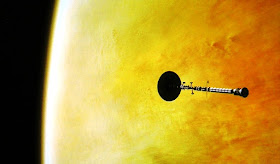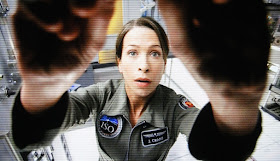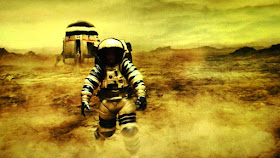"Man by his very nature is dependent on other men.
We need each other to survive.
The problem is getting anybody to admit that.
As a species we pride ourselves on being self-sufficient.
We call ourselves explorers. Independent. Courageous.
But what are we without the support of our brothers?
As one might expect visiting a place called Musings Of A Sci-Fi Fanatic, this blog and this writer enjoys a good space-based science fiction. In order to preserve precious time the preference would be for the subject to be good or better. The space-based science fiction is the preferred sub-genre. Star Trek: TOS (1966-1969), Stargate Universe (2009-2011), The Expanse (2015-present), Battlestar Galactica (1993-1998), and Space:1999 (1975-1977) are just a few examples of those enduring series within the category that I consider among the very best.

Every so often this site must roll the dice on those properties with which there is very little information available. Not much is known about a given title, but we want endeavor delve a little deeper sometimes when it comes to all things science fiction. If you're visiting a science fiction blog, it's important to cover it. If only there was a little more time.
Odyssey 5 (2002), Crusade (1999), Space Above And Beyond (1995-1996), Invasion (2005), Surface (2005-2006), The Event (2010-2011), Strange World (1999-2002), The 4400 (2004-2007), Threshold (2005-2006) and Taken (2002) are among such examples ripe for an alien abduction.

Threshold and Taken are among series that have been analyzed but I have yet to polish and publish.
Little known series are often little known for a reason but not always for the same reason. All have their fans. Cancellation is often decried by those fans and series are fought for quite vociferously. Firefly (2002) is one such exception having gone on to amass post-series legend with the Browncoats. Jericho (2006-2008) and others have followed suit.
Many of these unknown series have their flaws and drift away into the cavernous space from which they came only to be discovered by science fiction fans, like this writer, endeavoring to see just what they missed. Many disappoint. And some surprise.

Perhaps the one-off Pilot for the planned series Virtuality (2009) was the most intriguing in recent memory. You can see coverage of that failed Ronald D. Moore project here. Well, at least we have Outlander (2014-present).
But one such cancelled series that actually held my attention, gathered momentum with each new episode and lifted me into space to experience a journey and the idea of possibilities in unexpected ways was James D. Parriott's Defying Gravity (2009). Sadly, the series was shelved, sidelined, grounded before lift off---kaput after one season!
With thirteen episodes and a good ensemble cast, Defying Gravity offered a taste of what might have been for the failed ABC series, a series with Canadian, British and German co-production. There was a sense of leaping off into the abyss of space and experiencing the unknown, the danger and the beauty. Its spirit was easily tethered to the wonders found in film and television like Space:1999 or Sunshine (2007). Humanity on a mission of discovery into space and self-discovery.

This grounded drama arrived with an impressive resume in the form of Parriott. American writer, director, producer Parriott had been involved with television since 1975. He wrote Season Three, Episode 6, The Deadly Test, for The Six Million Dollar Man (1973-1978) in the early going. This was followed by scripting four episodes in Season One of The Bionic Woman (1976-1978). He would pen eleven (11) additional episodes for the series collaborating with the one and only Kenneth Johnson.
He contributed one episode as a scriptwriter to Season One of The Incredible Hulk (1977-1982) in the form of Guild, Models And Murder here. He made the switch to director for two episodes of The Incredible Hulk on Life And Death (Season One) and the affecting A Child In Need (Season Two). His long career led him to writing for Dark Skies (1996-1997) on three episodes (Mercury Rising, Ancient Future and Burn, Baby, Burn). His impressive list goes on before and after writing four of the thirteen entries here for Defying Gravity.

The story, with each installment, took its crew further into space and with them the viewers for a space-based, character-immersive drama helmed by actor Ron Livingston (Band Of Brothers).
Sci-fi geeks take heart. Fans can also find comfort in a cast that includes actors who have appeared elsewhere and are outstanding in their roles. Outside of Earth: The Final Conflict (1997-2002), Christina Cox (The Chronicles Of Riddick) offered terrific supporting work in Stargate SG-1, S1, Ep13, Spirits and S5, Ep20, The Sentinel. She later guested in the exceptionally creepy and thrill-heavy Stargate Atlantis, S5, Ep7 outing Whispers. Ty Olsson has also been a bit of a genre fixture appearing on Stargate SG-1, Battlestar Galactica, V and Continuum to name just a few. Malik Yoba was a series regular for two seasons of Alphas (2011-2012) as well as enjoying a recurring role in Revolution (2013). Laura Harris appeared in The X-Files, S2, Ep14, Die Hand Der Verletzt as well as Stargate Atlantis, S3, Ep15, The Game. So plenty of game from this group.

The story centers on eight astronauts (four men and four women) selected to travel aboard the Antares en route to Venus. The series also broadcasts its mission back home, documentary-style, a la Virtuality (2009). The crew communicates with Mission Control but there are mysterious forces at work that are impacting the crew on their journey at the hands of something referred to as Beta.
The series cleverly cuts between the present (2052) and the past (2047). The present witnesses the team in flight and in space, while the flashbacks offer additional character components during the training period.

Now Virtuality arrived in June 2009, but Fox scuttled the mission for a series. The similarly themed Defying Gravity arrived two months later undeterred by the competition, but did news of the series similarities quell any interest in a Virtuality take off? Despite resemblances one was never commissioned.
With funding from a number of sources Defying Gravity's production values are quite high and the series still looks soundly assembled today. It's casting choices and the chemistry of its ensemble is also stellar right from the word go and launch of its Pilot and second episode Natural Selection.

The science fiction tech for the series is handled with an over arching credibility looking to the near future. Scenes outside the Antares will remind one of the film Gravity. It may not have the state of the art visual effects of that film but it's not nearly as incredible (in a bad way) as that award-winning film either.
Defying Gravity was an unexpected sci-fi treat. With no expectations going into the series Defying Gravity proved to be a generally satisfying and terrific character-based sci-fi centered on the concept of exploring space. It explored men and women, together, and how they handle and cope with adversity and the trials of space.

Defying Gravity seemed fairly grounded in reality with regard to human nature too. Ronald D. Moore insists Battlestar Galactica was steeped in realism and the grit and grime of humanity, and it certainly relished the dark side. To the contrary, Defying Gravity isn't nearly as nasty, dark, mean-spirited or pessimistic. There is indeed an optimism and a spirit of cooperation in play between a series of characters that, despite conflicts and differences, either like one another or understand the need to work together out of respect for the mission, humanity and one another. There is a credibility and believability in play there. Granted Battlestar enjoyed a much larger field of players.
There is nothing extraordinary here outside of the wonder of space. No monsters. No Klingons. No Cylons. There is considerably more teamwork and even more tenderness than most science fiction offers or seems to permit today.

Episode 6, Bacon is a beautiful example of Defying Gravity's more human, positive qualities. While Battlestar is highly entertaining sci-fi, Defying Gravity is a much more relatable world.
If you're looking for space science fiction in the mold of Stargate Universe, but with a heart more in keeping with a kind of traditional pioneering American-styled spirit than Defying Gravity may be worth your time. As producer/creator James Parriott noted, "This is all about human beings being challenged to prove their worthiness in the universe" (SciFiNow #34, p46). This isn't space exploration as a by-product of survival like Space:1999, Battlestar or Stargate Universe, but as a noble pursuit of astronauts choosing to explore there. Space exploration as a calling to discovery. The nobility of our competing exceptionalism is a celebration rather than the mediocrity that is espoused and pursued by the leadership of today and a push to quell true distinction in favor of the participation trophy.

Even still, as the series progresses the more unsavory, darker aspects of this particular science fiction begins to reveal itself. The kinds of unsettling events or atmosphere that permeated films like 2001: A Space Odyssey (1968) or Sunshine begin to rear their ugly head making for an unexpected but welcomed shift in tension and mood.
With the arrival of Episode 3, Threshold, a deeper psychological complexity begins to seep into Defying Gravity's expert performances and complex relationships combined with a deepening of its genre mythology.
The science fiction concepts and ideas can be traced back to series like The X-Files (1993-2002) or as far back as the imagination of Arthur C. Clarke, Robert A. Heinlein or Ray Bradbury.

There was an opportunity here to be so much more as adventurers set off into the solar system but a creative six year plan became one of those entries in the genre struck down to a year despite accelerating on all thrusters in creative terms.
The series may lack the cinematographic sophistication or aesthetic or finesse of series like Stargate Universe, but thanks to a creative team yielding from the world of Grey's Anatomy there is plenty of emotional power to these stories and characters that traverse time and space and resonate with us a human level. There are indeed timeless issues in play and Defying Gravity is abundant with them.

The series departs into more obtuse, ambiguous areas of alien life and the more indefinable concepts of space travel around the arrival of Episode 9, Eve Ate The Apple, the first of the final five unaired episodes. Things become a bit more nebulous at this point and had it not been decided to take Defying Gravity off air I'm not certain how successful it would have been going forward anyway. This kind of mysterious science fiction is indeed welcomed, but with the mainstream public? Things become much more challenging to the viewer at this point and to some degree to the writers and creators of the series in selling its science fiction points coupled with questions of faith and God to a general audience. "Fractals" and other sci-fi concepts aren't exactly the kind of thing viewers get excited about it or rarely so anymore. Nevermind the fact some sci-fi fanatics like a monster or two.

Well, Defying Gravity delivers a solid thirteen episode run. There are moments that genuinely reminded me of Stargate Universe from a stylistic standpoint along with its use of music. It's quite likely the creators of Stargate Universe were even potentially fans of Defying Gravity or at least respected a number of its ideas adapting them to their own third iteration of the Stargate franchise. As it turned out SGU failed to grab its audience. Defying Gravity, too, was aiming high and also missed the mark required for longevity.
When Episode 13, Kiss, concludes the series just ends and does not end with satisfaction. Be warned. But the characters are infinitely likeable and each was indeed moving in new and unique directions. Relationships too were changing and the series was developing naturally and organically in a way that Space:1999 was developing in its Year One run but some criticize was unable to capitalize in Year Two.

It's a shame Defying Gravity was not given a chance to continue its mission plan. It was an intriguing premise mixing science fiction exploration into the stars searching for answers while exploring and testing humanity's inner faith.
Defying Gravity clearly missed registering the required numbers for a prime time series, but science fiction to the mainstream is always a tough sell particularly one with deeper philosophical strains. It's failure had everything to do with numbers and nothing to do with quality.
The series may not be quite as compelling as some of drama's top tier series, but the final product was a high caliber effort with considerable intent and aspiration. Quite simply, this is inspired stuff and this is one of those rare single seasons that comes recommended despite its many unresolved, loose ends. Such is the unfortunate reality of the non-renewal.
Sci-fi fans will be pleasantly surprised to find Defying Gravity was indeed reaching for the stars and it successfully takes the viewer there for its ephemeral run.
The disc includes all thirteen episodes, five of which were unaired beginning with Love, Honor, Obey.






























No comments:
Post a Comment